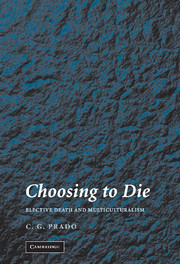Book contents
- Frontmatter
- Contents
- Preface
- 1 Setting the Stage
- 2 Criteria for Rational Suicide
- 3 Clarifying and Revising the Criteria
- 4 Application Issues
- 5 What Standards?
- 6 Relativism and Cross-Cultural Assessment
- 7 The Role of Religion
- 8 Assessment Latitude
- 9 The Realities of Cross-Cultural Assessment
- Works Cited
- Index
1 - Setting the Stage
Published online by Cambridge University Press: 05 June 2012
- Frontmatter
- Contents
- Preface
- 1 Setting the Stage
- 2 Criteria for Rational Suicide
- 3 Clarifying and Revising the Criteria
- 4 Application Issues
- 5 What Standards?
- 6 Relativism and Cross-Cultural Assessment
- 7 The Role of Religion
- 8 Assessment Latitude
- 9 The Realities of Cross-Cultural Assessment
- Works Cited
- Index
Summary
This book is about the two most fundamental questions underlying current debate about suicide, assisted suicide, and requested euthanasia in medical contexts. Those questions are whether choosing to die rather than endure hopeless torment can be rational, and, if so, whether it is morally permissible. Only if choosing to die is rational and morally permissible can we go on to consider whether provision of assistance in suicide or of euthanasia should be legalized and allowed by codes of medical ethics.
The questions are hugely complex and cannot be asked without provision of criterial contexts within which they can be answered. If it is rational to choose to die, it is so within philosophical or conceptual parameters. If it is morally permissible to choose to die, it is so within either universal or culturally determined parameters. Moreover, because most cases of choosing to die occur in institutions like hospitals and hospices, institutional cultures — the policies, priorities, and practices of the relevant institutions — need to be considered in establishing the latter parameters.
My original concern with choosing to die or what I call elective death was purely philosophical: I focused on whether choosing to die can be rational; that is, whether it can accord with reason and be judged to be for the best. At the time I felt that if my work was applicable in actual dealings with individuals prepared to die rather than face personal and physical devastation, that was all to the good, but that was not my main concern.
Information
- Type
- Chapter
- Information
- Choosing to DieElective Death and Multiculturalism, pp. 1 - 25Publisher: Cambridge University PressPrint publication year: 2008
